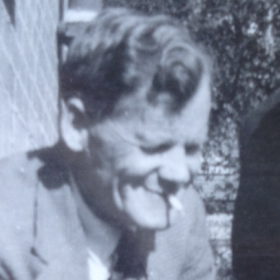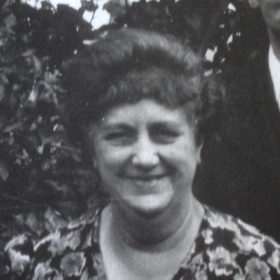View entry
Name: McNEVIN, Arthur Edwin


Birth Date: 9 Oct 1891 Lahore
Death Date: 18 Nov 1944 Bournemouth
First Date: 1925
Profession: Loco driver
Area: Eldoret
Married: In Bombay 28 Jan 1921 Winifred Gladys Hopper b. 18 Feb 1902 Canterbury, d. 12 July 1963 Bournemouth
Children: Patricia (Prentice) (6 Aug 1922 Canterbury); John Michael (1 Oct 1927 Kington, Herefordshire-2019)
Book Reference: Red 31, Hut
War Service: Railway Volunteer Rifles (South African Rifles, DCM)
General Information:
Gazette - 22/7/1925 - Arrived on 1st Appointment - Loco. Driver, Ug. Rly. - A.E. McNevin
Harry Fecitt, Indian Volunteers in the Great War East African Campaign (web) In August 1914 Indian Volunteer units were recruited from white and mixed-race members of the civilian community whose expectations were that they would only be used operationally within India for local or home defence. However on the declaration of war several members of Volunteer units wished to serve overseas and their willingness allowed the Indian authorities to form three units for service in East Africa. An artillery battery, a Maxim Gun Company and a railway defence section were dispatched along with a few specialists such as signalers. The North-Western Railway Volunteers This unit initially supplied a 12-pdr, 12-cwt gun and a four-man detachment (plus five followers) for an armoured train. The men and their gun sailed from India with Indian Expeditionary Force “B” arriving off Tanga, German East Africa (GEA), in November 1914. During the two days of fighting onshore the detachment remained on board along with the two Railway Companies, Sappers and Miners, that it was supporting, and withdrew to Mombasa with the re-embarked survivors of the British defeat at Tanga. After escort duties on the Uganda Railway and a short spell of action on the BEA coast the gun team was sent north to Kisumu on Lake Victoria. Here the gun was mounted on the vessel Winifred that was being used for transport duties on the lake. The gun came into action against ground targets during the successful British raid on Bukoba, GEA, in June 1915. At this time the North-Western Railway Volunteers appear to have been reinforced and converted into a six-Maxim Gun detachment in preparation for the invasion of GEA. In the latter half of 1915 a 2-gun section was deployed at Mzima Springs in the Tsavo Valley. The railway gun was left in the hands of the Royal Navy on Lake Victoria and was moved onto the vessel Kavirondo. During the battle for the Latema-Reata ridge line on 11th March 1916 the North-Western Railway Volunteers under Lieutenant H.P.C. Browne were attached to the Indian Volunteer Maxim Gun Company (see details below), being used as No 4 Section of that Company. After this successful action, which opened the door into GEA for the British, the North-Western Railway men appear to have been used as an 2 independent machine gun detachment and they probably served intheatre longer than any other Indian Volunteer unit. Three Distinguished Conduct Medals (DCMs) appear to have been issued to North-Western Railway Volunteers and the citations in the London Gazette give an idea of the conditions under which these men fought: 94 Sjt A.E. McNevin (attached Bharatpur Imperial Service Infantry) For conspicuous gallantry and devotion to duty, In the face of heavy enemy fire he handled his gun with great coolness and remained himself in action with it after the majority of his team had become casualties. His courageous determination was most praiseworthy. 56 Cpl C. Lowe For conspicuous gallantry and devotion to duty. His behaviour and coolness under fire was very marked. In one action he set a fine example to his gun team, keeping his gun going after his team had nearly all become casualties, he himself being wounded later. 98 Pte C. Boardman He worked his gun until his team had been reduced to two men. He was also successful in getting his gun out of action on being rushed by the enemy. He collected the remaining gun porters and returned to the firing line, where he remained all night until the section was relieved next day. Temporary Lieutenant W.T. Biscoe was Mentioned in Despatches.
1939 England and Wales Register living in St Germans with wife and dau
Worked in Nigeria in 1930s
